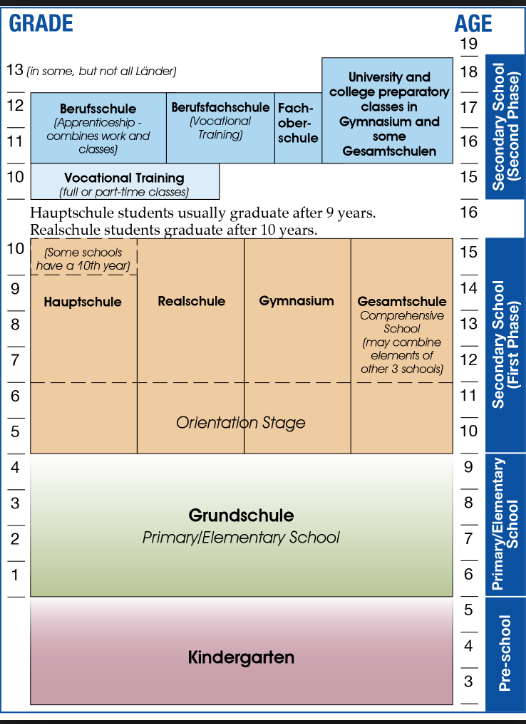 My summer vacation took me to Berlin, Germany for several weeks to better understand the culture, art and history of this remarkable city in late August. While I was focused on taking a break from education, I couldn’t help but reflect on how Berlin has been shaped by education while I enjoyed the art, music and Berliners.
My summer vacation took me to Berlin, Germany for several weeks to better understand the culture, art and history of this remarkable city in late August. While I was focused on taking a break from education, I couldn’t help but reflect on how Berlin has been shaped by education while I enjoyed the art, music and Berliners.
I mostly explored Berlin’s neighborhoods by foot and bicycle. It is a great city to travel by bike. I saw some remarkable art, was able to dive into the city’s always relevant Nazi history and GDR past as well as hang out in some very hip music spots.
Berlin’s dark history from the 1930’s to 1989 is evident throughout the city with small and large reminders nearly everywhere you look. I regularly ran into small memorials describing what happened at a particular spot on a sidewalk, whether it was home to a Jewish family who had perished in the Holocaust, or a visit from Martin Luther King Jr. to speak on the need to tear down the Berlin wall in 1964. It is also filled with other descriptions of the brighter aspects of Berlin’s history whether a description of Max Planck boldly displayed on a building where he lived or a quote from Albert Einstein.
We Americans could learn much from Berliners as how we might more honestly reflect on our own history as related to slavery and the genocide of Native Americans. Germany, like America, is a world leader that has struggled mightily to learn from their dark past while also celebrating what has made each of us great nations.
“No idea stays pure. Even the flowering of art isn’t pure. And the sun has spots. All geniuses menstruate. On sorrow floats laughter. In the heart of roaring lurks silence.” ―Gunter Grass Dog Years, 1963
I tried to take a break from education, but I couldn’t help myself from having conversations with Berliners about their learning experiences, comparisons between German and American education systems and the role of education in Germany. How is one’s worldview shaped by an East vs. West German education experience prior to 1989? What’s the impact of whether you speak Russian or English as a second language? While I was exploring the city, it was also hard not to notice how different Berlin elementary school playgrounds are from ours or how much the Berlin parks seem to be utilized by schools during the school day.
American public education has many roots in Germany. Horace Mann, one of the Architects of our system, led an effort in the 1850’s to replicate the Prussian system of public education in Massachusetts after visiting schools in Europe. Prussia and then later all of Germany was the first modern nation to create a universal public education system. The German and American education systems share many commonalities though governance of the German system is more federally controlled. Like the US, Germany has struggled with purpose of public education. One of the German education system architects, Wilhelm Humboldt thought the goal of schools should be personal enlightenment while another German educational leader, Georg Kerschensteiner thought school’s primary focus should be to build skills for work and to contribute towards betterment of the state. Sound familiar?
This struggle over the purpose of school in Germany played out in the system design with three primary tracks, the lowest socioeconomic levels for work training (Hauptschule and Realschule) and the higher socio-economic level for university level preparation (The Gymnasium). These divisions begin towards the end of elementary school. Recently, there are a growing number of comprehensive schools (Gestam) that include all tracks under one roof, similar to a typical American high school. Germany’s focus on vocational education and work-based internships played an important role in the country’s economy and continues to be seen as a driver for Germany’s economy.
After spending more time reading about the German education system their results, I wonder if we could learn few things in the following areas-
- Education for Work. Training for work has been a core aspect of the German education system since its start. They have embedded work training and internships into their public education system for over a century. Germany’s largest businesses support this school to work programing through partnerships, funding, internships and training. It has been described as “dual system” which is an extension of what might be described as an apprentice system for nearly every job sector in Germany. Industry works closely with the education system to provide courses, tracks, training, internships and apprentices so that there is a mostly seamless track from school to work. Over 50% of German students are in this track. American efforts in this space have been fragmented and often reduced to small pilots.
- Be Careful with tracking. The Germans have a highly tracked education system that is mostly tied to class with few opportunities for students go from more work based tracks to academic tracks. While the work education tracks in Germany have been largely successful in supporting students to leave school with the the work skills for middle income jobs in manufacturing and other sectors, economic mobility is far lower in Germany than in the United States which has been falling in recent decades. While the US can learn much about creating quality educational pipelines for work, we must be very careful to not replicate Germany’s educational caste system and limit opportunity for all students.
- Meaningful high school diplomas. Most other nations have more meaningful high school diplomas than the US. Germany, like most, requires that students pass a rigorous series of assessments, the Abitur exams, that are tied to national expectations for the educational track that the student is enrolled in for high schools. US high school diplomas for the most part with the exception of some specialized high schools or IB schools only require that students pass a minimum course load which is primarily tied to seat time with little or no standards for what a student should know or be able to do. The US system compared to Germany has next to zero accountability for what students should know or do before leaving high school. Having students demonstrate they ready for work or further education is probably the most important lesson Americans should apply to our system. We could learn much here.
- Play as learning- There is a growing movement in Germany for young kids to be supported to have more play time outdoors in parks and the wilderness. It seems that as American preschools become structured and more like elementary schools that we may be wise to follow the impact of these efforts to support kids to be more self-reliant, and entrepreneurial. I am naturally biased to think these sorts of learning environments can be very powerful if of course students are also learning basic academics when appropriate but we need more research to follow the development of students in these programs.
- A focus on National Improvement- Given Germany’s relatively strong education program throughout most of the 20th Century, it was a bit of a surprise for Germans to discover in 2000 that their PISA scores were relatively low compared to other European countries. It caused a bit of a crisis that spurned policy makers to fine tune the existing system by clarifying standards, curricula, assessments and most importantly systems to monitor their impact and improvement. A decade later Germany has made fairly dramatic improvement on PISA scores relative to other countries. Germany stands out as a country as a historically high performer that lost standing and now has retooled to improve successfully. With all of our efforts to improve with most falling flat, particularly here in Colorado with flat NAEP scores we might learn a thing or two about what Germany has done that was most effective towards improving educational outcomes.
I realize that you cannot just find and replace one aspect of one country’s education system for another aspect in a different country. The cultures and other aspects of the country’s social and economic fabric make that difficult but I do think there is a great deal to be learned by looking at other systems and learning how we might get better. Germany has a number of features that we should consider as we strive to improve our schools.

